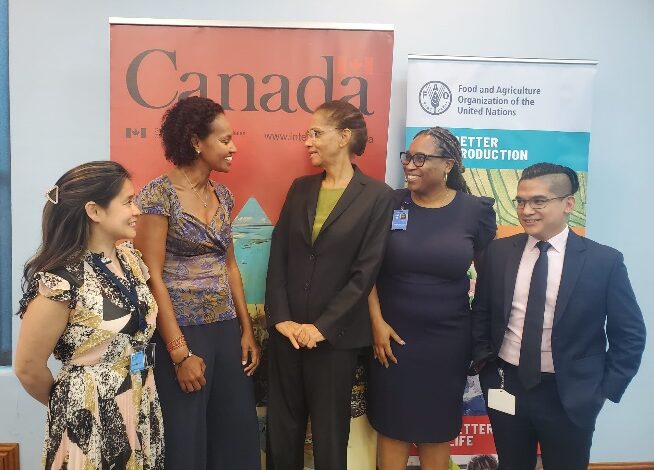| A New Finance Goal for The Vulnerable: Islands Demand Equity At the Bonn Climate Conference, Island Nations Call for Trillions in Climate Finance and Bold Reform of International Financial System to Accelerate Transition Away from Fossils, Build Resilience, and Address Loss and Damage  Speakers at the AOSIS & LDC Chair Press Conference atSB60: Michai Robertson, Lead Negotiator on Climate Finance, Alliance of Small Island States (AOSIS); Anne Rasmussen, AOSIS Lead Negotiator; Evans Njewa, Chair, Least Developed Countries (LDC)Bonn Climate Conference (SB60), Germany, 7th June, 2024 Speakers at the AOSIS & LDC Chair Press Conference atSB60: Michai Robertson, Lead Negotiator on Climate Finance, Alliance of Small Island States (AOSIS); Anne Rasmussen, AOSIS Lead Negotiator; Evans Njewa, Chair, Least Developed Countries (LDC)Bonn Climate Conference (SB60), Germany, 7th June, 2024As negotiations progress at the Bonn Climate Conference (SB60), the Alliance of Small Island States AOSIS published its proposal for a new goal that will incentivize 1.5°C ambition across the climate agenda. The new goal must serve all developing countries but especially the small island developing states (SIDS) and least developed countries (LDCs) who are acutely impacted by climate change and structurally unable to cope without international support. For island nations and vulnerable people worldwide, the 1.5°C warming limit is not optional. AOSIS set the bar for 1.5°C ambition in the Paris Agreement because it is the only limit that can give SIDS a chance for a climate secure future. AOSIS and the Least Developed Countries (LDCs) group held a united press conference on the opening day of the Bonn Climate Conference, highlighting the marked inadequacy of the previous $100billion goal, and their shared call for developed countries to lead on providing funds for a new climate finance goal. “Island nations are calling for COP29 to agree on a climate finance goal that delivers for 1.5°C, ensures their sustainability now, and guarantees the future of island nations,” said Anne Rasmussen, lead negotiator of AOSIS. “To do so will require trillions of dollars as the first Global Stocktake confirmed atCOP28. It will also require reform of the international financial architecture and an end to business as usual, including fossil fuel financing. It will take a focused approach to revamping the system to ensure SIDS and LDCs are not left behind.” “As we move closer to what is being billed “The Finance COP” it is our hope that the bigger countries in particular will commit what is urgently needed to finally drive necessary climate action forward,” she added. AOSIS calls for international financial institutions to address the systemic inequities that currently plague small islands, including the high cost of capital and steep transaction costs, and make the international financial system work for those on the frontlines of the crisis. The Alliance has called for the goal to be deliberate and targeted to the mitigation, adaptation, and loss and damage needs and priorities of developing countries. It also sets out a pragmatic approach to ensure honesty in reporting on what counts as climate finance. Market-rate loans for SIDS and finance for fossils can no longer count. The proposal also calls for simple, fast and streamlined access to finance, and AOSIS noted that emerging economies are able to access climate finance much faster than SIDS and LDCs. “The institutions that channel this money to us are not built with the context-specific aspects of SIDS and LDCs in mind – they are built for bigger countries because they want bigger impact”, said Michai Robertson, Senior Advisor to AOSIS. “They want the bigger numbers. And that is absolutely not fair in the context of climate finance.” “With regard to the previous $100 billion goal, the figures are unfair and inequitable for SIDS and LDCs with 63 billion out of the 91 billion actually being loans – therefore 69% of this $100 billion for climate finance was debt. Based on the OECD2022 report, it actually shows overall decreases in grants period from SIDS and LDCs since 2016. SIDS’ grants share from 2016-2020 was 60%, while our grants share from 2016-2022 was 53%. This is a 7% decrease in grants during the overall period.” “SIDS and LDCs are here to reaffirm our partnership to operationalize our special case. What is the point of the NCQG if our special circumstances are not operationalized? We will then have funding with no direction, with others receiving more than usual though we are the ones on the frontline. The reason we must frontload these trillions is without that, SIDS and LDCs will be unable to stay on the path of1.5C which is crucially important to us. We need to use the NCQG to accelerate action in this critical decade, right now.” As discussions on the new goal begin in earnest over the next two weeks, AOSIS will encourage all parties to draw on its submission as negotiations continue, which sets the bar for ambition and climate justice in the new goal. |
June 4, 2025





